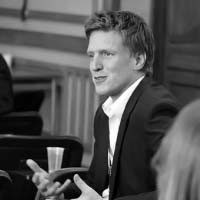
Markus Appenzeller
Markus Appenzeller is an urban planner and architect educated in Germany and the US. With his practice MLA+, with offices in London, Rotterdam, Rio de Janeiro, St. Petersburg and Shanghai, he is involved in large scale planning projects as well as architecture commissions in Europe, Asia and South America. Previously also working for renowned firms KCAP and OMA, he has been and still is involved in many high profile projects including the Olympic Legacy Masterplan in London, urban development projects in Russia, and architecture and planning projects in China. Markus Appenzeller is also active as a lecturer and educator – currently curating the multidisciplinary master course ‘Design of Urban Ecosystems’ at ITMO University in St. Petersburg. MLA+ is actively involved in more than six architecture and urban planning projects in Shenzhen. Here the company’s focus is on urban regeneration and establishing more inclusive, more quality-minded design and implementation processes. MLA+ has been collaborating with a number of Shenzhen based firms over long periods of time and together with them has been embarking on developing methods and tools of improving the quality of urban development in ‘the world’s biggest new town’.

Christine de Baan
With a background in architecture and design, Christine de Baan (DEBAAN, Rotterdam, The Netherlands) works as advisor, curator, and editor, and is a frequent lecturer and moderator. Recently she was Program Director of the Department of Design for Cape Town World Design Capital 2014, and advisor for the Dutch participation in Beijing Design Week. Earlier, De Baan was executive director of the four-year strategic internationalization program ‘Dutch Design Fashion Architecture’ in China, India, and Turkey, funded by the Dutch ministries for Culture, Economy and Foreign Affairs, Head of Program for the International Architecture Biennale Rotterdam, and curator for the Visual Culture part of the China Contemporary exhibition in Rotterdam, 2006. She chaired the main advisory board of the national Dutch arts fund and often acts as consultant to national and municipal governments on design policy and education.
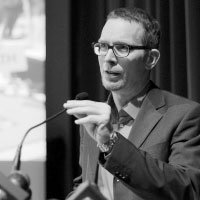
JaapJan Berg
JaapJan Berg (1965) is an independent researcher, journalist and moderator in the field of architecture and spatial planning. He is owner of Bergplaats. JaapJan Berg works as a project manager and researcher for INTI. Until 2015, he is also project leader of the community ‘De Vinexmensen’, one of three communities that operate within the overall program of the Dutch manifestation Jaar van de Ruimte 2015. JaapJan Berg publishes regularly in various (international) professional periodicals and regularly acts as chair of debates and discussions on architecture and spatial planning. Previously JaapJan Berg worked as a curator at the Netherlands Architecture Institute (NAI) and was senior coordinator at the architectural center of Almere (CASLa). JaapJan Berg studied art history at the University of Amsterdam (UvA).

Kees Christiaanse
Kees Christiaanse studied architecture and urban planning at Delft University of Technology. In 1980 he joined the Office for Metropolitan Architecture (OMA) and was appointed partner in 1983. In 1989 he founded his own company, now KCAP Architects&Planners, in Rotterdam. Throughout his career Kees Christiaanse has always combined teaching and research with his professional work within KCAP, which has generated fruitful cross-fertilizations. Since 2003 he is head of the Chair for Architecture and Urban Design at the Swiss Federal Institute of Technology (ETH) in Zurich. In 2009 Kees Christiaanse was curator of the 4th International Architecture Biennale Rotterdam (IABR) with the title “Open City. Designing Coexistence”. Since 2010 he is program leader of the Future Cities Laboratory (FCL) in Singapore. Next to his work as an architect, Kees Christiaanse focuses on urban assignments in complex situations and on guiding urban processes. He is an expert in the development of the revitalization of former industrial, railway and harbor areas, which is illustrated by KCAP’s work in the docklands of Rotterdam, Amsterdam, Hamburg and London. He is a member of various urban Advisory Boards in Zurich, Dublin, London, Hamburg, Geneva and the World Business Council for Sustainable Development. In early 2013 he was appointed Chairperson of the External Advisory Board of the Architecture and Design Department of the Singapore University of Technology and Design.

Juan Du
Juan Du is Associate Professor and Associate Dean of the Faculty of Architecture at the University of Hong Kong. She also leads IDU_architecture, a research and design office with projects ranging from the extent of built forms to the social and ecological processes of the city. Juan Du has worked extensively in practice in the US, Europe and China. She has taught in the Department of Architecture at Massachusetts Institute of Technology and the Graduate Center of Architecture at Peking University. Juan Du’s work has been exhibited internationally including the 11th and 12th Venice Architecture Biennale, the Vienna Architekturzentrum Exhibition, and the Brazil International Exhibition of Architecture and Urbanism. Her design, research and writing on emergent urbanisms of the developing contemporary city have been published internationally, including China Voices, Urban Trans Formations, Domus, Urban China, and Journal of Architectural Education. Juan Du was the Chief Curator of Hong Kong’s Exhibition in the 2010 Venice Architecture Biennale, and Curator of Housing an Affordable City Exhibition at the 2011 Shenzhen Hong Kong Biennale. She is currently working on a book focused on the extended urban history of Shenzhen and the role of the city’s informal urbanism.
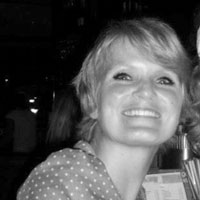
Simone Eijsink
Simone Eijsink is, as Head of the International Department, responsible for all the international governmental activities in and for Almere. With the upcoming 2022 World Expo on Horticulture Floriade, the international contacts are growing, as a new international network on Growing Green Cities is being developed with cities like Shenzhen, Taipei, Milan and Toronto.
Prior to her position in Almere, Simone Eijsink worked for the Peace Palace in The Hague, the Ministry of Foreign Affairs, the International Institute of International Relations ‘Clingendael’ and the European Headquarters of the Japanese company Epson, on corporate social responsibility. Her scientific background is in international public law and human rights law, for which she received two master titles, from the Universities of Maastricht and Utrecht. For both universities, she wrote several publications on international human rights protection in international relations.
She lived abroad in Sweden and Vienna, as part of the research program of the International Institute of Applied Systems Analysis (IIASA).

Han Feenstra
Han Feenstra (1966) is senior policy advisor at the Energy Market Department, Directorate-General for Energy, Telecommunications and Competition, Ministry of Economic Affairs since 2009. He is mainly involved in gas policy and international energy relations. He graduated as Sinologist from the University of Leiden and worked at the Netherlands Trade & Investment Office in Taipei from 1995 to 2000. In 2000 he joined the Ministry of Economic Affairs in The Hague, at the headquarters of the Netherlands Foreign Investment Agency (NFIA). From 2004 to 2009 he was Executive Director for the NFIA in China, based at the Netherlands’s consulate in Shanghai.
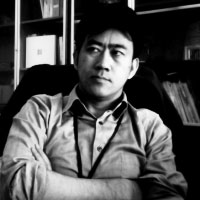
Weiwen Huang
Weiwen Huang is the ex-Vice Chief Urban Planner of the Urban Planning & Land Resource Commission of Shenzhen Municipality, and the Director of the Shenzhen Center for Design. He is Loeb Fellow of the Graduate School of Design, Harvard University, and is director of the Urbanism\Architecture Bi-city Biennale of Shenzhen. Weiwen Huang keeps exploring and reforming urban planning and design in Shenzhen. He continually seeks to establish new regulations for fair and open design competitions in his city. As a civil servant, he maintains an independent research program, and writes articles criticizing automobile-oriented and super-scale space design, attaching greater importance to public space, green transportation, and public participation in urban planning. In recent years, he has lead a research team working on a new development model for the new town, such as MGC (multiple ground city) and SLID (super low impact development). He pushes UABB and SCD as platforms for exchange and communication about urbanism and built environment, especially in regard to the urban village, urban renewal and regeneration, land damage; these issues are the real challenges of his city, Shenzhen. After the 2008 Sichuan earthquake, he initiated the first NGO by architects in China, named Re-Tumu, to provide design for the disaster-stricken or rural area. INTI and SCD have been collaborating extensively in Guangming New Town, Shenzhen.
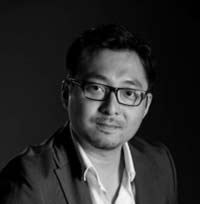
Tat Lam
Dr. Tat Lam, expert about China’s developmental issues, is the CEO of Shanzhai City, a social enterprise based in Hong Kong and Shenzhen for impact-oriented urban innovation projects in Asian emergent cities. Since 2010, Tat Lam directed a team of 30 researchers and urban designers under Urbanus Research Bureau (URB) in Hong Kong and Shenzhen, consulting private and government entities on large-scale developments. URB completed 50 urban design projects in 5 years, with clients such as Shenzhen Urban Planning Commission, Vanke Group, Poly Real Estate Development, and Beijing East District Government. Tat Lam developed urban anthropological research methods on architecture and urban studies during his doctoral degree at UCL (London) and his fellowship at Columbia University ChinaLab (New York) and applied for his urban consultancy practice in China. Tat Lam, as research scholar at China Megacities Lab at Columbia University and adjunct assistant professor at Architecture School at CUHK, is also closely connected with international academic resources. Most recently Tat Lam was executive curator of the Hong Kong Shenzhen Bi-city Biennale of Architecture and Urbanism in 2013. Tat Lam has participated in the New New Towns program ever since its start in 2012.
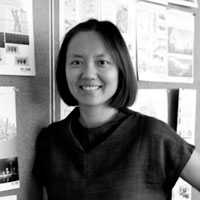
Doreen Liu
Doreen Heng LIU received her MArch from UC Berkeley and Doctor of Design at Harvard Graduate School of Design. Her research focuses on contemporary urbanism and architecture in the Pearl River Delta, and the specific impact of urbanization on design and practice in China today. She established her own design practice NODE (Nansha Original Design) in Hong Kong and Nansha, Guangzhou in 2004, and is also chief architectural consultant for the Fok Ying Tung Foundation for the Nansha City development. Her built architectural works include the Value factory – Main Entrance & Warehouse renovation – Venue A in 2013 Shenzhen/Hong Kong Urbanism/Architectural Bi-city Biennial. Her design works have been widely published in many international & domestic professional magazines including Architectural Record and Domus. She and her office also participated in various architectural and art exhibitions. Since September 2008, she has been teaching at the School of Architecture of the Chinese University of Hong Kong, and was appointed Adjunct Associate Professor in 2011. In 2014, Doreen Liu was one of the curators for the Hong Kong Pavilion at the International Architecture Biennale in Venice. Doreen Liu has participated in the New New Towns program ever since its start in 2012.

Mary Ann O’Donnell
An anthropologist by training, Mary Ann O’Donnell has conducted ethnographic research in Shenzhen since 1995, aiming to make legible the shifting cultural landscapes of China’s flagship Special Economic Zone. Interests and interventions include Handshake 302, a collectively run art space in Baishizhou; Shenzhen Noted, a blog that theorizes post socialist urbanization in Shenzhen; and ongoing collaboration with Fat Bird Theatre, Shenzhen. Her research has been published in TDR: The Drama Review, positions: East Asian cultures critique, and Cultural Studies Special Issue on Hong Kong. O’Donnell is an editor at Architectural Worlds (Shenzhen University) and the Director of the Urban Village Special Forces, a citizen group that aims to bring Shenzhen’s urbanized villages into public discussions about urban planning and renewal projects.

Stephen Read
Stephen Read is a teacher and researcher at the Department of Urbanism of Delft University of Technology. His subject is the forms of cities, but he is interested also in urban change and the forms urban economies, cultures and societies might take and the forms of development that produce these. He has been working with the INTI led Shenzhen Scenarios research project led by Qu Lei at Delft for the last three years and is involved in a separate three year secondment to the University of Hong Kong (funded by UKNA), working on a project called Paths of urbanisation in Shenzhen New Town: Exploring emerging forms of polity, community and economy.
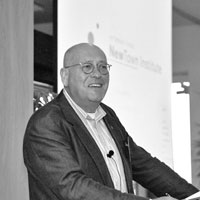
Arnold Reijndorp
Arnold Reijndorp (1948) studied architecture at Delft University of Technology. After graduation he worked for the town-planning department of the city of Rotterdam and was responsible for the urban renewal operation in the Old-West district of the city. A growing interest in the social and cultural developments in cities brought him to the sociology department of the University of Amsterdam. As an independent researcher and university lecturer he tried to bridge the gap between urban practice and academic discourse. From 1998 – 2000 he was visiting professor Urban Sociology and Urbanism at the Faculty of Architecture of the TU-Berlin. He lectured at universities and schools of architecture in The Netherlands and abroad. Since 2006 he holds the Han Lammers chair of Socio-economic and spatial developments of new urban areas at the Department of Geography, Planning and International Development Studies of the University of Amsterdam. Arnold Reijndorp has participated in the New New Towns program ever since its start in 2012.

Bert Smolders
As senior consultant urban development Bert Smolders has been involved in urban projects for ARCADIS in China since 2002. He worked on a large number of projects in Wuhan, was appointed advisor to the Wuhan municipality planning office and given the Yellow Crane Tower Friendship Award by the Mayor of Wuhan. Through ARCADIS subsidiary RTKL in Shanghai he worked on urban development projects all over China focusing on the relation between water management and urban planning. In addition to his work in urban development in China, he is program manager for the Shelter program, the partnership between UN-Habitat and ARCADIS, a CSR program. In the Shelter program, ARCADIS provides pro-bono expertise for over 50 UN-Habitat projects all over the world, with examples such as the preparation of a master plan for the redevelopment of Tacloban Philippines after typhoon Haiyan, disaster risk reduction in urban planning in Rwanda, and integrated coastal planning and management in Costa Rica.

Tiffany S.W. Tsui
Tiffany Tsui has over 15 years of international experience in sustainable urban and regional development as strategic planner and project director. From 2001 to 2005, she was the director of the China operation of EMSI, the first international firm providing green building design & consultancy services in China. She successfully introduced the concept of “green buildings” and the LEED green building certification to leading Chinese real estate developers and companies. She managed the very first green building projects that are LEED certified across China, which serves as a model for more companies to ‘go green’. She joined the Royal HaskoningDHV Group(former DHV group) in 2005, and led the effort to develop integrated planning and design solutions and innovative business models for sustainable regional and eco-city developments in China. Her main focus includes delta development, water management, eco-city development and metropolitan food security. Under her leadership, DHV has provided strategic planning and design services for projects including the Caofeidian Eco-city development, Zhongshan Coastal New City and Nansha New City. She is currently pursuing her PhD at the Erasmus University in the field of economic geography.

Ton Venhoeven
Ton Venhoeven is founder of VenhoevenCS architecture+urbanism, an innovative Dutch design office for sustainable, integrated and smart architecture, urban development and infrastructure. Besides his work as an architect and urban planner, Venhoeven advises on Smart City, Micro City and Healthy City, integrated planning, multimodal mobility networks and transit-oriented development (TOD). He is the former Dutch Chief Government Advisor on Infrastructure and the City. Currently he works as a consultant for various international public and private organizations, such as the Chinese Ministry of Housing and Urban-Rural Development, the World Bank in China and the European Network for Urban Vitality. Ton Venhoeven is also program leader of the multi-annual program Towards2050: Developing a Sino-Dutch Approach towards Sustainable Urbanization.
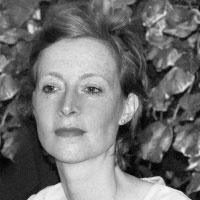
Linda Vlassenrood
Linda Vlassenrood is Program Director at INTI, where she set up the international research program New New Towns. Why we need to rethink the city of tomorrow today. The New New Towns program is dedicated to improving the urban and social quality of eight exceptional New Towns. Linda Vlassenrood has been working in Shenzhen (China) and Chandigarh (India) since 2011. These cities are experiencing fast urbanization and they face major urban planning issues. New New Towns serves a unique role in bringing together international and local expertise in a multidisciplinary think-tank. It is a catalyst for the exchange of knowledge between students, researchers, design professionals, developers, policymakers and politicians. This is done through student workshops, international design workshops, conferences and exhibitions. Linda Vlassenrood worked as a curator at the Netherlands Architecture Institute from 2000, serving as chief curator from 2008 to 2011. Her department worked successfully on a rich and diverse program of exhibitions, lectures and debates, events and educational programs for professionals as well as broader audiences. Linda Vlassenrood has curated a significant number of noteworthy exhibitions and events on architecture in its broadest sense. With China Contemporary she placed Chinese architecture on the international map in 2006.
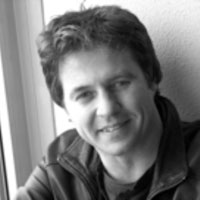
Ronald Wall
Ronald Wall is an economic geographer and urban planner, and has worked for renowned urban planning offices (such as OMA and MVRDV), governmental organizations (such as Dutch Ministry of Economic Affairs and UN-Habitat) and academic institutions (such as STRELKA and Berlage Institute). He is head of the economic geography (UCR) department at the IHS / Erasmus University Rotterdam, The Netherlands. He specializes in socio-economic research and how this is related to urban development. Ronald Wall has worked on projects in Africa, The Middle East, Asia, Latin America, and Europe. Over the past 15 years, the central focus of his work has been the development of resilient urban planning, based on interdisciplinary collaboration and by understanding the local, regional and global network characteristics of cities. Ronald Wall has worked with international architects, scientists, policymakers and academics - and has won various architectural prizes, been awarded several research grants and published in leading scientific journals. Ronald Wall teaches at urban planning and economics schools. Ronald Wall has participated in the New New Towns program ever since its start in 2012.

